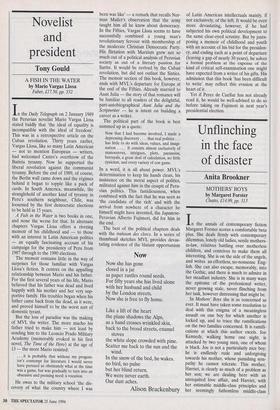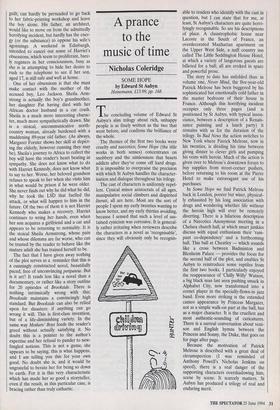Unflinching in the face of disaster
Anita Brookner
MOTHERS' BOYS by Margaret Forster Chatto, £14.99, pp. 313 In the annals of contemporary fiction Margaret Forster scores a comfortable beta plus. She deals firmly with contemporary dilemmas, lonely old ladies, senile mothers- in-law, relatives battling over motherless children, and contrives to make them all interesting. She is on the side of the angels, and writes an effortless, no-nonsense Eng- lish. She can also escape, memorably, into the Gothic, and there is much to admire in her steadfast industry. She is in many ways the epitome of the professional writer, never growing stale, never flinching from her task, however distressing that might be.
In Mothers' Boys she is as concerned as ever. It must have taken some resolution to deal with this enigma of a meaningless assault on one boy for which another is locked up, and to trace the ramifications on the two families concerned. It is ramifi- cations at which this author excels. Joe Kennedy, walking home one night, is attacked by two young men, one of whom is black. Joe is not a particularly nice boy: he is endlessly rude and unforgiving towards his mother, whose punishing sym- pathy he cannot tolerate. This mother, Harriet, is clearly as much of a problem as her son; we are dealing here with an unrequited love affair, and Harriet, with her estimable middle-class principles and her seemingly fathomless middle-class guilt, can hardly be persuaded to go back to her fabric-printing workshop and leave the boy alone. His father, an architect, would like to move on from the admittedly horrifying incident, but hardly has the ener- gy (or the substance) to oppose his wife's agonisings. A weekend in Edinburgh, intended to cancel out some of Harriet's obsessions, which seem to proliferate, bare- ly registers in her consciousness, busy as she is in attempting to hide her desire to rush to the telephone to see if her son, aged 17, is still safe and well at home.
One of her obsessions is that she must make contact with the mother of the accused boy, Leo Jackson. Sheila Arm- strong is actually the boy's grandmother, her daughter Pat having died with her African doctor husband in a car crash. Sheila is a much more interesting charac- ter, much more sympathetically drawn. She is a stoical, uncommunicative north- country woman, already burdened with a maddening 89-year old father. (As always, Margaret Forster shows her skill at depict- ing the elderly, however cunning they may be). Sheila's journey to Africa to collect the boy will have the reader's heart beating in sympathy. She does not know what to do with Harriet Kennedy, does not know what to say to her. Worse, her beloved grandson refuses to speak to her when she visits him in what would be prison if he were older. She never finds out why he did what he did, why he took the LSD that fuelled the attack, or what will happen to him in the future. Of the two of them it is not Harriet Kennedy who makes a recovery. Harriet continues to wring her hands, even when her son acquires a girlfriend and a car and appears to be returning to normality. It is the stoical Sheila Armstrong, whose pain and whose dilemma are far worse, who can be trusted by the reader to behave like the mature adult she has trained herself to be.
The fact that I have given away nothing of the plot serves as a reminder that this is a cunningly constructed novel, beautifully paced, free of unconvincing peripateia. But is it art? It reads less like a novel than a documentary, or rather like a story outline for 20 episodes of Brookside. There is nothing intrinsically wrong with this; Brookside maintains a convincingly high standard. But Brookside can also be relied upon for disasters: if anything can go wrong it will. This is first-class invention, but of a life-diminishing variety. In the same way Mothers' Boys feeds the reader's greed without actually satisfying it. No doubt this is a pointer to the author's expertise and her refusal to pander to new- fangled notions. This is not a game, she appears to be saying; this is what happens, and I am telling you this for your own good. No doubt she is, and it would be ungrateful to berate her for being so down to earth. For it is this very characteristic which has made her so good a storyteller, even if the result, in this particular case, is bracing rather than truly cathartic.

































































 Previous page
Previous page